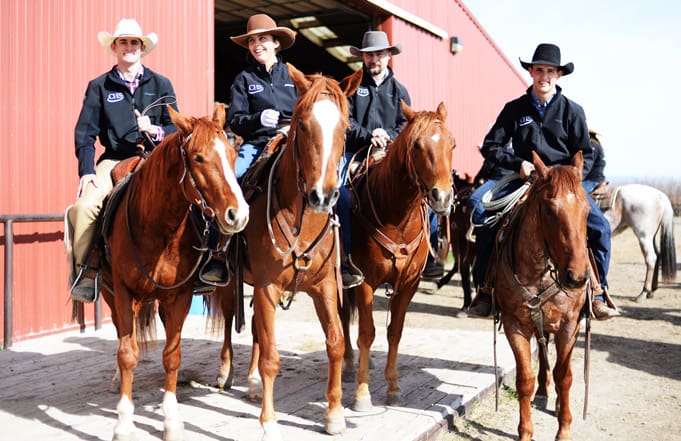May 26, 2017
For Ava Duncan, horsemanship isn’t just her career; it’s her oxygen.

“We’re constantly, as natural horsemanship majors, being required to put ourselves in the horse’s shoes. Learn about the horse’s perspective.”
“You couldn’t find an animal much more different than us, what they want in life and what they need, what their priorities are. So as human beings you’re almost restructuring how you think and how you approach problems. Of course, it’s with a horse, but I think that teaches us how to do that better in our relationships and our communities.” I had never thought about natural horsemanship as a path to finding human empathy, but Ava Duncan has a rare ability. Many people have passions, but very few are able to communicate their passion with you so deeply that you almost begin to feel it yourself. Perhaps it’s something she learned from the horses.
Her response came after I asked her what role horses have to play in modern society. In the past, they were necessary as a means of transportation. That is no longer true, so why do people still feel the urge to ride? Duncan believes that rather than using horses, humans can now learn from them.
“I think horses and horse people in general have a huge place in society, and can teach other people and other industries a lot of really important life lessons.”
Duncan could talk about horses all day, and although I’ve never had even a passing interest in the subject, I would happily listen. The University of Montana Western couldn’t ask for a better advocate for their natural horsemanship program.
“Truth be told, I can’t do the horse thing as a hobby. It’s my oxygen,” she said.
A recent graduate of Montana Western, Duncan was born and raised in Atlanta, Georgia. At the age of five, she decided she wanted to become a horse trainer.
“Montana Western is the only university in the country with a four-year Natural Horsemanship Degree. I didn’t have any other options if I wanted to ride horses for school,” she said.
Although she is from the south, Duncan is strangely suited for Montana. After living here for less than a quarter of her life, she already considers it home. She even embraces the harsh winters: “I love the cold weather. I actually hate the hot. It’s disgusting. It was a long way, and my family lives on the other side of the country, so I was definitely scared (when I first came here). It was so different than what I thought it was going to be, and so much better.” Duncan describes her upbringing as suburban, so more than the weather, the lifestyle in Dillon, Mont. was the biggest change. “This was culture shock, big time. I actually fell in love with Montana though. I told my mom after two weeks of living here: ‘Everything that never made sense about my life, just started making sense.’ The culture, the people, the authenticity of this place, is amazing.”
On her time at Montana Western, Duncan cited the block schedule as a big positive. Going to school for three hours a day left her with plenty of time to ride every horse she could get her hands on. She was also grateful for the flexibility of her instructors. “Over time, you can see where the program goes from extremely structured to just guidance. You start to see people develop their own ways of achieving excellence with horses. I think that’s what the program is at its core. It’s teaching people how to think about what’s going on with a horse in an effective way that suits them, versus creating robots.”
Duncan often speaks about horsemanship as a means of self-improvement, but her degree has also made her attractive to employers. She was able to find a job immediately upon graduation. She’ll be “starting” colts for a ranch in Wyoming. This means she’ll be riding them for a year, training them for their future as athletes in the sport of polo. A job like this is a dream come true for her.
“When I’m on a horse, I don’t think or feel or see anything else. People talk about being in the moment. In all other areas of my life, I have to work on being in the moment. But when I’m on a horse, I don’t have to work on it. In that moment, for me, nothing else exists.” I don’t know anything about horses, but I know exactly what she means. At such a young age, Duncan has done something truly remarkable. She found what she loved and went after it. It sounds so simple, but what she did is anything but typical.
I’d like to think she’s on a colt right now, free from worry, pain, or stress. She and the horse understand each other completely. They move together as one. She is alive… and nothing else matters.